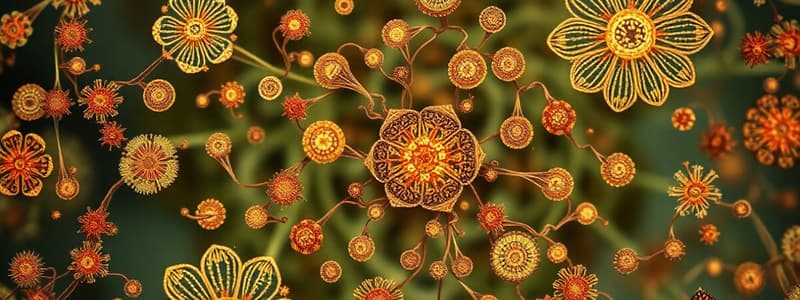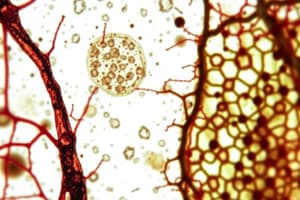Podcast
Questions and Answers
What term did Robert Hooke use to describe the small compartments he observed in cork?
What term did Robert Hooke use to describe the small compartments he observed in cork?
- Organelles
- Microorganisms
- Tissues
- Cells (correct)
Which scientist first observed tiny moving particles in rainwater that were later identified as bacteria?
Which scientist first observed tiny moving particles in rainwater that were later identified as bacteria?
- Anton van Leeuwenhoek (correct)
- Louis Pasteur
- Robert Hooke
- Gregor Mendel
What primarily accounts for the variation in cell structure among different plants and animals?
What primarily accounts for the variation in cell structure among different plants and animals?
- Environmental factors
- The age of the organism
- The specific function each cell performs (correct)
- Cell division rates
Which of the following statements about specialized cells is true?
Which of the following statements about specialized cells is true?
What kind of samples did Robert Hooke study to make his observations?
What kind of samples did Robert Hooke study to make his observations?
What is the fundamental unit of living organisms?
What is the fundamental unit of living organisms?
Which of the following statements is true about plants?
Which of the following statements is true about plants?
What distinguishes multicellular organisms from unicellular organisms?
What distinguishes multicellular organisms from unicellular organisms?
Which of the following is an example of a unicellular organism?
Which of the following is an example of a unicellular organism?
What role do cells play in living organisms?
What role do cells play in living organisms?
Study Notes
The Microscope and Cells
- Robert Hooke used a microscope to observe cork cells
- Cells are the fundamental units of all living organisms
- Cells from different plants and animals vary in shape and structure
- Differences in cells are due to their specific functions
- Cells work together to form tissues and organs
- Tissues and organs perform specific tasks in organisms
Plant Cells
- All plants are composed of cells
- Plant cells, like other cells, are responsible for protecting the organism, obtaining nutrients, and other vital functions
- Plant cells contain chemical elements
- Unicellular organisms, such as bacteria (see Fig. 6.2), are composed of a single cell
- Multicellular organisms, such as many plants and animals, are composed of multiple cells
Studying That Suits You
Use AI to generate personalized quizzes and flashcards to suit your learning preferences.
Description
Explore the fascinating world of cells as you dive into the contributions of Robert Hooke and the differences between plant and animal cells. This quiz will test your understanding of cell structure, functions, and the relationship between cells, tissues, and organs. Perfect for biology students looking to reinforce their knowledge.




